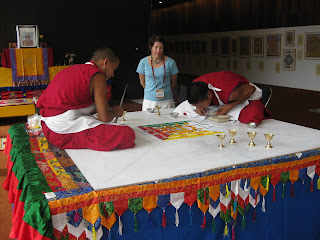Instead of writing my final reflections of the whole Parliament in paragraph form, I've distilled them down into a "Top-ten list!" Easier for you to read, easier for me to write. Contrary to evidence presented thus far, I can be terse and pithy when necessary!
10. You know less than you think you do about other religions.
9. It's a big, wide world out there--get out and make yourself at home in it.
8. Embodied community beats the pants off virtual community--every time, every day. So seek out real people!!
7. Everyone interprets her/his faith a little differently in the first person. There is no actual "textbook" Christianity, Judaism, Islam, etc., etc. lived out anywhere--practice is always a bit [or a lot] different from theory. [This makes things both infinitely more interesting, and appreciably more complex!]
6. Being away is good; being home is better--but you only learn this by being away.
5. People are strange, endearing, annoying, wise, goofy, and lovely--sometimes all at the same time.
4. Religious faith is an extraordinary source of transformative power in the world--faith really can move mountains.
3. Your appreciation of your own faith deepens as you grow in knowledge and understanding of another faith tradition. [Trust me, I could have gone on for paragraphs here!]
2. When it comes to faith, listening is almost always more important than talking.
1. I am very, very glad I am a Lutheran! There are lots of reasons for this, but I will elaborate on just two. First, our eucharistic doctrine of Real Presence, and how this leads to a strong affirmation of the physical body, and the physical world. I honestly have to say I got tired of hearing the human being described as a soul, who uses/possesses/inhabits the body like a vehicle. I heard that at various times from a Jain, an Aborigine, a Sufi, and a Hindu, just to name a few; and frankly, I don't buy it. Second, the Lutheran doctrine of sin and grace. I didn't realize it until the end, but at no time in the Parliament did anyone talk about sin. Oh, I get it, sin is a buzz kill, and it is much more uplifting to focus on what we can do in the world, and what we can do together as people of faith. But frankly, that simply ignores the profound depth to which all of us, and all human societies, are mired down in sin; and the fundamental reality that we can do nothing apart from the free gift of God's grace and the power of the Holy Spirit. Sure, we have things to learn from others, and sure, we have weaknesses in our own tradition; but honestly, overall, I really, really like Lutheran theology!
So, that's all from Melbourne! Thanks to all of you who have followed this blog--it has been a fun way to feel connected so many thousands of miles away from home.
Blessings
Kristin Johnston Largen
* A note on terminology: when you go into a café or deli, they will ask you, "For here or take away." The first time I heard it, it took me a few seconds to figure out what was being said--although once I figured it out, I think it makes even more sense than, "To go," in some ways!























